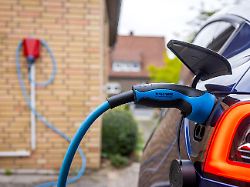Funding expired
The number of newly registered electric cars in Germany is collapsing
October 5, 2023, 1:22 p.m
Listen to article
This audio version was artificially generated. More info | Send feedback
There will soon be significantly more electric cars on German roads. However, numbers on new registrations from September significantly diminish hopes of this. They literally collapse. Experts are not surprised; the decline was announced.
After government funding for commercial electric cars expired, the number of newly registered battery vehicles (BEVs) fell significantly in September. 31,714 new electric cars hit the road last month, as the Federal Motor Transport Authority (KBA) announced. That was almost 29 percent less than in September of the previous year. Their share of all new registrations was around 14 percent – almost 6 percentage points less than in the previous year. Last August, around one in three newly registered cars was an electric car. Registrations of plug-in hybrids fell even more sharply by 45.7 percent, while hybrid registrations rose by 6.9 percent.
The decline does not come as a surprise to experts. “Business owners had brought forward planned large-scale purchases of electric cars in August in order to still be able to benefit from government subsidies,” said mobility expert at the consulting firm EY, Constantin Gall. “These purchases are now missing, of course.” Government funding for commercial purchases of electric cars expired on September 1st.
A similar development to last year is likely to occur again this year: the state subsidy for private electric car buyers will fall again at the turn of the year. “There will be another interim high at the end of the year,” predicted Gall from EY. Next year, however, there could be a “rude awakening if demand for electric cars settles at a lower level.”
Electric cars are still booming
Looking at the first three quarters, there has been a significant increase of 14 percent so far this year compared to the comparable period in 2022, and for purely electric cars the increase is even 42 percent. “At the same time, compared to the pre-crisis level of 2019, the German car market is still significantly behind at minus 22 percent,” explained the Association of the Automotive Industry (VDA).
The weak sales of electric vehicles is also noticeable in the overall development of new registrations. According to the KBA, 224,502 cars were newly registered across all segments in September. That was almost as many as in September of the previous year. In the past few months, the number of new registrations had increased significantly, even if it was still a long way from the pre-crisis level.
“The market continues to thrive primarily on reducing the high order backlog,” said the President of the Association of International Motor Vehicle Manufacturers, Reinhard Zirpel. “We are therefore increasingly concerned about the persistently low order intake.”
